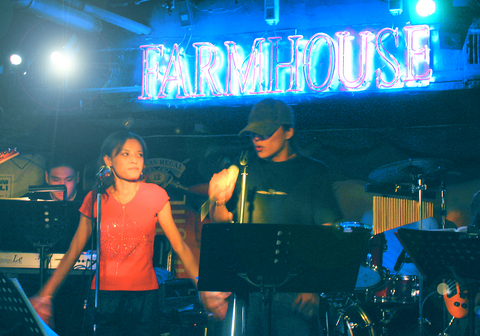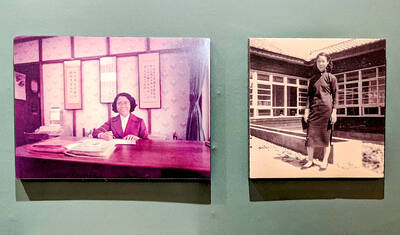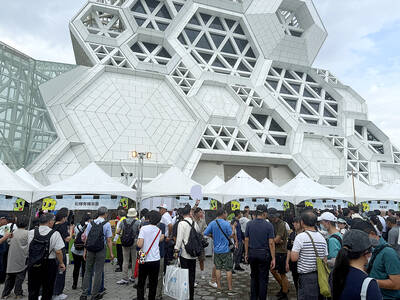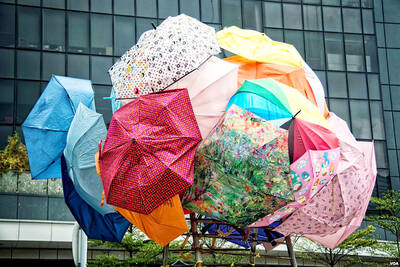Live-music junkies in Taipei have been in need of a fix. With the recent closure of Underworld, in the Taiwan Normal University neighborhood, the capital city has been left with one less venue at which to hear live bands. For Taipei, that's akin to a one-armed man losing a finger.
But Taipei's collective artistic memory is short. For nearly three decades there has been a place where live bands have plugged in and played even as its original crowds have grown older and its newer crowds have become smaller.
The Farmhouse, in Taipei's once-booming Combat Zone, started life as a "live music disco" before disco became something altogether different. And little has changed since, except the well-trodden dance floor doesn't get trod on much anymore.

PHOTO: DAVID MOMPHARD, TAIPEI TIMES
"There's a lot more people than this on the weekends," said Lin Zi-chun (
"It can even get crowded in here on Saturday, when Rubber Band plays," Lin said. "There'll be people on the dance floor doing the cha cha in a line. But it's not like what it used to be -- or at least what I've heard it used to be like."
What Lin has likely heard is about a time some 10 years ago or more, when punters were elbow-to-elbow, belly up to bar and the rest of the place was standing-room-only. The house band, MIT or Made in Taiwan, was well-known throughout the city and could pack the place even on weeknights. It wasn't uncommon to hear a 20-something Wu Bai (
What happened to the live music scene? Depending on who you ask, blame is assigned anywhere from the 1979 departure of the US military, who first made the area notoriously raucous and gave it its moniker -- to the rise of Taipei's East District (
Perhaps, for Farmhouse, the quality of the bands that started playing there precipitated the fall in the number of punters that came to hear them. Most of the early-week bands cover Western pop tunes from the 1980s and 1990s, reading the music from a book and in some cases stumbling through the lyrics. I last week heard the most desperate bar-room rendition of Desperado that has ever been performed; the singer called it quits after a dozen or so bars, apparently struggling to read his own handwri-ting and unsure of the notes.
As Lin said, the situation is different on the weekends, Saturdays especially, when veteran rockers Rubber Band take the stage and people line-up for the cha cha. But the question is, as Farmhouse nears 30 years old, will its long-standing punter-pulling acts like Rubber Band continue to pull in big enough crowds to keep the lights on?
Let's hope so. Or else Taipei's live-music junkies will be singing their own version of Desperado.
Where to go:
Farmhouse is located at 5, Ln 32, Shuangcheng St., Taipei
The current roster of bands includes Question (Tuesdays), Circle Band (Wednesdays), Blue Flame (Thursdays), Puzzle
(Fridays), Rubber Band (Saturdays) and Babes (Sundays).
Call (02) 2595 1764.

Water management is one of the most powerful forces shaping modern Taiwan’s landscapes and politics. Many of Taiwan’s township and county boundaries are defined by watersheds. The current course of the mighty Jhuoshuei River (濁水溪) was largely established by Japanese embankment building during the 1918-1923 period. Taoyuan is dotted with ponds constructed by settlers from China during the Qing period. Countless local civic actions have been driven by opposition to water projects. Last week something like 2,600mm of rain fell on southern Taiwan in seven days, peaking at over 2,800mm in Duona (多納) in Kaohsiung’s Maolin District (茂林), according to

Aug. 11 to Aug. 17 Those who never heard of architect Hsiu Tse-lan (修澤蘭) must have seen her work — on the reverse of the NT$100 bill is the Yangmingshan Zhongshan Hall (陽明山中山樓). Then-president Chiang Kai-shek (蔣介石) reportedly hand-picked her for the job and gave her just 13 months to complete it in time for the centennial of Republic of China founder Sun Yat-sen’s birth on Nov. 12, 1966. Another landmark project is Garden City (花園新城) in New Taipei City’s Sindian District (新店) — Taiwan’s first mountainside planned community, which Hsiu initiated in 1968. She was involved in every stage, from selecting

The latest edition of the Japan-Taiwan Fruit Festival took place in Kaohsiung on July 26 and 27. During the weekend, the dockside in front of the iconic Music Center was full of food stalls, and a stage welcomed performers. After the French-themed festival earlier in the summer, this is another example of Kaohsiung’s efforts to make the city more international. The event was originally initiated by the Japan-Taiwan Exchange Association in 2022. The goal was “to commemorate [the association’s] 50th anniversary and further strengthen the longstanding friendship between Japan and Taiwan,” says Kaohsiung Director-General of International Affairs Chang Yen-ching (張硯卿). “The first two editions

It was Christmas Eve 2024 and 19-year-old Chloe Cheung was lying in bed at home in Leeds when she found out the Chinese authorities had put a bounty on her head. As she scrolled through Instagram looking at festive songs, a stream of messages from old school friends started coming into her phone. Look at the news, they told her. Media outlets across east Asia were reporting that Cheung, who had just finished her A-levels, had been declared a threat to national security by officials in Hong Kong. There was an offer of HK$1m (NT$3.81 million) to anyone who could assist